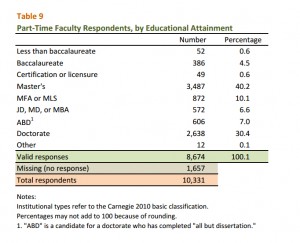The adjunct activist movement is currently mobilizing its forces behind a new “adjunct relief” bill in the California legislature, AB 1690. The proponents of this bill are portraying it as a much-needed “job security” measure for part time contract faculty at state-run higher ed institutions (in this case the California community college system). The bill is being touted as a model for adjunct relief that other states could also adopt.
There’s a disturbing devil in the details of this proposed bill. Rather than helping all adjuncts, it actually attempts to codify something that I’ve long predicted about the “beleaguered adjunct” movement as typified by Precaricorps, the New Faculty Majority, the SEIU, and similarly aligned groups. Despite their claims, this movement is not actually engaged in adjunct relief across the board. Rather they are seeking job protection measures that benefit older and less-qualified “career adjuncts” at the direct expense of younger newly-minted PhDs and ABDs who have stronger CVs and research records.
The evidence is buried in Section C of the bill, which codifies a “seniority” system that is designed to protect the employment of older adjuncts by explicitly disadvantaging younger applicants for the same position:
(i) As new assignments become available due to growth or attrition, these assignments shall be offered in seniority order to those part-time, temporary faculty members who have qualified to be placed on the seniority list pursuant to subparagraph (B), and previously successfully completed that same assignment. These assignments may be made up to a maximum annualized load, exclusive of summer and intersession terms, in the range of 60 to 67 percent of a full-time equivalent load.
The motives for this provision may be found in the economics of the adjunct job market. More specifically, multiple data points attest that a sizable majority of current adjunct faculty have extremely weak credentials vis-a-vis their full time counterparts (as well as another subset of “working professional” adjuncts who moonlight in the classroom).
- Surveys consistently show that only 30% of current adjuncts have a PhD – the minimum degree to be hired in most full time faculty positions.
- Many adjunct CVs on the whole tend to be weaker, have fewer peer reviewed publications, more “self-published” works of dubious rigor and merit, and less evidence of future research.
- Some adjuncts do not even pursue any scholarly research. At all. They claim that they work absurdly long hours to teach and therefore lack the time to do anything else.
Each of these conditions carries significant implications within the adjunct job market itself, to say nothing of the full time faculty market. An adjunct who (1) does not have a terminal degree, (2) lacks reputable publications, and (3) does not have any ongoing research of substance will have a weaker CV than almost any newly-minted PhD or even ABD who seeks adjunct employment to hold him/herself over while navigating the academic job market.
The seniority provisions of AB 1690 will automatically favor the older “weak CV” adjuncts simply because they’ve made a career out of adjuncting even if the younger adjunct with a finished PhD and several publications deserves the job on merit. This bill will likely have the effect of killing off adjuncting as an option for younger academics who are just starting out their careers and are trying to gain valuable teaching experience to be more competitive on the full time academic market. But far from recoiling at such a disastrous policy, the so-called adjunct movement is likely to relish in it. Seniority protections for older, less productive, less qualified adjuncts is precisely what they want, even if it means engaging in statutory age discrimination against younger faculty.
